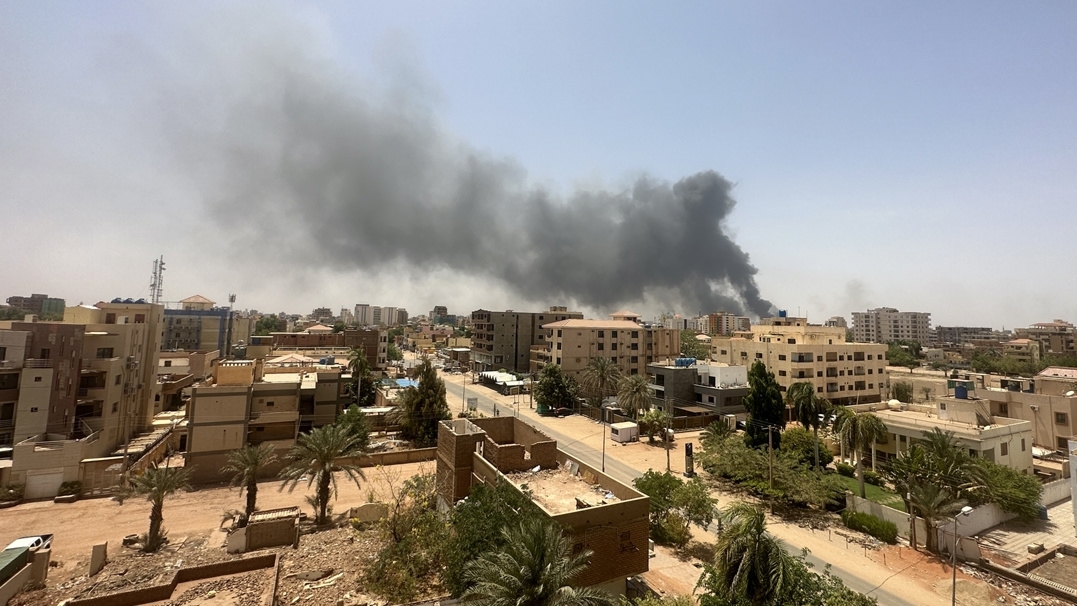Sudan unrest: How did we get here?

Clashes between the Sudanese Armed Forces (SAF) and the powerful paramilitary Rapid Support Forces (RSF) broke out in the capital Khartoum and other cities on Saturday following weeks of tensions between the two sides.
Sounds of gunfire and explosions rocked the capital as fighting focused in strategic areas, like the Presidential Palace, military headquarters and the public broadcaster.
Both sides have accused each other of starting the violence, which topped months of disagreements over power-sharing arrangements to transition the country to civilian rule.
How did we get here?
The current political crisis in Sudan can be traced back to 2019, after a nationwide protest movement against former president Omar al-Bashir ended with the military removing the three-decade-long autocrat.
Stay informed with MEE's newsletters
Sign up to get the latest alerts, insights and analysis, starting with Turkey Unpacked
The transition towards full civilian rule that followed was brought crashing to a halt in October 2021 by a military coup led by SAF commander and Sudanese de facto head of state General Abdel Fattah al-Burhan and his deputy Mohamed Hamdan Dagalo, who is the RSF's chief.
In December 2022, the military and civilian leaders signed a preliminary deal to end military rule and enable a two-year civilian-led transition towards elections.
However, political disagreements have stood in the way of reaching a final resolution.
The integration of the RSF into the military is chief among those disputes.
Delays in the signing of the deal were exacerbated by a growing personal rivalry between al-Burhan and Daglo, who is better known as Hemeti.
Mobilisation of forces
Earlier this week, tensions reached a boiling point after SAF warned of the mobilisation and redeployment of troops by the RSF in Khartoum and other cities without its approval.
RSF forces entered the city of Merowe, located 330km north of the capital, and surrounded its airport on Wednesday.
They were also seen mobilising forces in the north of Khartoum and outside the RSF base in Bahri.
A retired general and military expert told Middle East Eye that the mobilisation in Merowe is particularly important because it hosts a strategic airport and an airbase. Control of the base by either side could determine victory in any potential military confrontation, he said.
The base also houses Egyptian fighter jets which were used in joint Sudanese-Egyptian drills in 2020.
Amid a flurry of local and internal mediation efforts, the military and the RSF appeared to head towards de-escalation on Friday with both sides reiterating their commitment to peaceful means.
The fighting on Saturday morning caught many by surprise.
Burhan vs Hemeti
Burhan and Hemeti have maintained an uneasy alliance since the October 2021 coup.
The two men have different sources of power and wealth, as well as different international sponsors.
Burhan is favoured by Egypt and by figures who held power under al-Bashir.
He also controls a sprawling military-industrial complex, the Military Industry Corporation, one of the country's largest state-owned corporations, which produces a range of defence equipment.
Meanwhile, Hemeti, who was once head of the notorious Janjaweed militias in Darfur, where he controls gold mines, has influential supporters in the United Arab Emirates and Saudi Arabia.
Analysts estimate the RSF, which he commands, numbers about 100,000 fighters, with bases and deployments across the country.
The RSF evolved from the so-called Janjaweed militias that fought in the early 2000s conflict in Darfur, where they were used by Bashir's regime to help the army put down a rebellion. At least 2.5 million people were displaced and 300,000 killed in the conflict in total, and the Janjaweed are accused of widespread human rights abuses.
Over time the forces grew and were used as border guards in particular to clamp down on irregular migration. In tandem, Hemeti's business interests grew with help from Bashir, and his family expanded holdings in gold mining, livestock and infrastructure.
Middle East Eye delivers independent and unrivalled coverage and analysis of the Middle East, North Africa and beyond. To learn more about republishing this content and the associated fees, please fill out this form. More about MEE can be found here.





